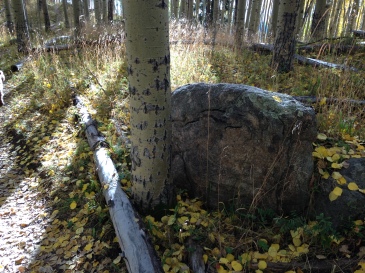Having been a musician for the first half of my life, I grew up with the joy of learning, training, and harvesting the fruits of my efforts. It was not always fun. Many times I would have preferred to do something else, but I found that if I kept at it I improved, and I really enjoyed seeing that. This is one of the benefits when children or adults study music and arts—or really, anything. But I got lucky in some ways, because I easily excelled in music and found much appreciation from others.
I’ve found that many people did not find such a satisfying route in practice in their childhood. Some remember mainly the moments in which they were forced to do something they didn’t like. Nevertheless, in the bigger picture, we are now where we are because of the training we have received and the effort we have applied. On top of conscious practicing there are the many unconscious things we repeat daily and often. We find all of these in our patterns and habits.
 What we do often is what we will do often
What we do often is what we will do often
This maxim is nearly one of the laws of nature. Teachers know that their students are very likely to remember what they repeat often. In learning theory there is the classical idea that we remember:
- 10% of what we read,
- 20% of what we hear,
- 30% of what we see,
- 50% of what we see and hear,
- 70% of what we say, and
- 90% of what we say and do.
Meditators know that it’s easier to sit every day than only sometimes. Strange to say, isn’t it? But it’s true. The regularity creates a habit and a continuity which allows for more ease in continuing on. In the same way that a body that trains regularly is stronger and more flexible, a mind is, too. A body that has to sit for many hours each day at a table will change its posture and shape accordingly. In the same way, in a mind that is trained unconsciously we will find certain strong and unconscious patterns. On the other hand, a mind that is consciously trained will demonstrate certain strong and conscious patterns.
Less time leads to less practice and…
…less practice leads to less time for practice. If we are really honest, is it truly not possible to find 10 minutes each day to do something we really love? How could that be? My feeling is that the challenge of most people is not to find the time to practice, but to find the joy, the longing for practice. For things we don’t remember or imagine as pleasant it’s just so much harder to find time. We need to find what is truly pleasant for us.
 Too much!
Too much!
I would guess that many of you know the feeling of coming home after a long day and being too exhausted to meditate. The same is true for all of these other things we would really love to do. In my eyes this is very important information our exhausted body gives to us. And we need to respect this.
The question is, what is the right thing to do? We can only find this from honest observation of ourselves. If we follow our habit and really observe how it goes and how that feels, we can gain a clear and compassionate insight into our automatic solution. We must see again and again, nonjudgmentally, what we do. Very naturally new behavior can arise from that.
Creating positive tendencies
If we notice exactly what is happening, wise decisions will occur to us. For example, noticing we are exhausted, we can observe what we do when we feel that way. And we will see if that doing really serves us well. Maybe it’s better for us to enjoy some relaxing and stretching yoga poses in the evening and do a short body scan before bed. The morning might be the perfect time for meditation before we leave the house. Another person might prefer exactly the opposite.
 We don’t have to force ourselves to do anything “positive.” But if we can accept what is, and after that, notice whether how we react really benefits us, then gradually we will create positive tendencies. This works because we have the feeling that we would like to repeat what really felt good the last time. In contrast, a daily meditation done with rigid discipline might lead to a mind that only “sits” if it has to, like a dog being ordered around. This might lead to the growing wish to stop meditating all together.
We don’t have to force ourselves to do anything “positive.” But if we can accept what is, and after that, notice whether how we react really benefits us, then gradually we will create positive tendencies. This works because we have the feeling that we would like to repeat what really felt good the last time. In contrast, a daily meditation done with rigid discipline might lead to a mind that only “sits” if it has to, like a dog being ordered around. This might lead to the growing wish to stop meditating all together.
Our own practice
If we can find the supportive form, the right duration and time for practice, alone or with the support of a teacher who is really good for us, then a journey of transformation can begin. Which practice we choose and however we fit it into our days, weeks, months and years, it’s very important to really value and enjoy it without allowing for a deadening discipline to take over.
In one sense, this is very complicated, because each one of us is complicated. But if we follow the discipline of observing nonjudgmentally how we suffer, and noticing what truly relieves it for us, forgetting about what we think should work or what works for others, then our perfectly tailored practice will develop all on its own. It will naturally be born in us.
Continuity
Nevertheless, as a starting point, it’s really beneficial to practice daily. Our practice can become second nature, like brushing our teeth and enjoying our favorite morning tea or coffee. If I haven’t managed to sit in the morning then I really miss it. It’s like my day starts with a mind that didn’t get a chance to “brush its teeth.” 🙂 After many years of practice, I’ve developed an instinct that longs for mental clarity and inner orientation. I notice when it’s missing, when I’m hazy and unclear, a bit lost. During my days I notice that my mind tries to sneak in many bits and pieces of “simply being.” Especially if meditation didn’t happen in the morning, my mind wants to clean itself!
As I’ve said many times, I really enjoy the little breaks at red traffic lights, waiting at a checkout, or for my computer to do what it needs to do so that I can do what I need to do. I don’t force myself to take these breaks: my mind looks for them like little treats. Especially I enjoy the moments of a tea break, or an interesting sound, color, or any other beautiful moment that invites a brief rest in just being. These breaks occur with a joyful mind that is naturally so close to a meditative mind.
Practice is not just outer discipline, it can be a truly nourishing inner longing and refreshment, coming together. I hope you’ll find and enjoy some moments of clarity, peace, and beauty during your day.
Love,
Anka


[…] of meditation and other calming practices, trust is a very important quality. Not only for the “practice” itself but for our own development as well. Trust enables our mind to find peace and calm […]
LikeLike
[…] of finding the right support and teachers, I learned the skills I needed in order to train diligently every day for many years. I learned to envision my goal, I learned to not give up and to train […]
LikeLike
[…] exercises and meditation. Looking at society in general, I find that my sense of the need for these practices is heightened, which is why I return to writing about them again and again. I don’t know how I […]
LikeLike
There’s definately a lot to find out about this topic. I like all of the points you’ve made.
LikeLike
Thank you! And yes, it’s a huge topic:)
LikeLike
[…] So let’s begin today to allow ourselves to be more aware, less careless or unconscious in more and more moments, to regain the art of living. As someone who works with elders at the end of life, those who made a conscious choice to be present to their life tell me they feel they have really lived. Others, for whom this idea has not occurred, sometimes express the regret of feeling that they missed life as it was rushing by. We can choose now to do something different. […]
LikeLike